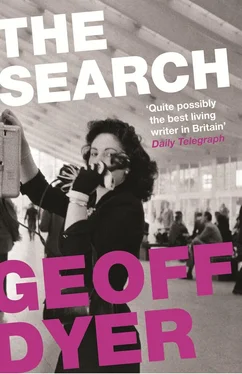Tracking: he turned the word over in his mind, taking the measure of his feelings. After Brandon’s death he’d sworn — not sworn, to swear not to do something always seemed like an incitement to do it — he’d resolved not to get involved in anything like that again, especially now, now that it was illegal, dangerous.
Six years previously tracking had been an industry virtually. It started as a response to rewards being offered for information regarding the whereabouts of prominent figures who had gone missing. One case attracted a lot of publicity when the man claiming the reward called himself a professional tracker. The term caught on and the numbers of people disappearing, it seemed to Walker, increased in order to keep pace with the growing numbers of people calling themselves trackers. It got to the point where, like lights left on in an empty house, a pile of clothes left on a beach was taken as a sign not of accidental drowning but of an inadequate attempt to disguise a disappearance. Whenever anyone disappeared there was always somebody who had a vested interest in finding him or her again. Anyone with a taste for adventure was lured into the idea of tracking; the classified pages of small-town papers always included a few ads from trackers offering their services. Even the government department responsible for missing persons — Finders to themselves and everyone else — was getting in on the act. A number of officers were alleged to have located a missing person and then sold the information to a private concern. Finders keepers, it was commonly joked, was the motto of the Missing Persons’ Department. Lured by the prospect of big money, anyone in the department with ambition and initiative went solo after a few years. The government moved quickly: missing persons, it ruled, had to be investigated by the government department only. Tracking was illegal without a licence — and a licence became impossible to obtain. The move backfired: putting trackers beyond the law meant that a lot of people living outside the law got in on tracking. Many trackers had been less than reliable or scrupulous in their methods, but now that they were firmly outside the law their methods became increasingly ruthless. Like trafficking, tracking became one of the standard activities of the underworld. And this was the world Walker was being lured back into.
The day after Rachel’s visit he walked along the beach, hearing the freeway roar of the ocean, feeling the fling and reach of spray. He picked a curve of brown glass from the sand. Sea-lions were clowning in the breaking waves. A dog scampered after a chewed husk of ball. Clumps of kelp, driftwood.
Later, when the light was turning hazy, he called her from a telephone on the boardwalk. He had not known what he was going to say when he dialled her number but hearing her voice he decided on impulse. Yes, he said, he’d do it.
They spent a day together, sitting outside in the first warm sun of the year. Rachel was wearing a pale dress and a cardigan, one button missing. Walker asked her to tell him everything about Malory, the people he knew, his business contacts, his habits. Whenever he asked for more details she paused and answered his questions patiently. Walker made notes, so intent on watching her speak that at times he did not hear what she was saying. He drifted, thinking of the happiness that might lie in wait for them. Then he was jolted back to the present. Rachel was telling him of the allegations of corruption that had come in the wake of Malory’s winning a huge bridge-building contract.
‘You didn’t hear about it?’
‘No. Sorry. Like I said, I never read papers.’
‘Television?’ ‘Only sport.’ ‘Not films even?’ ‘Not really.’ ‘Alex —’ ‘If I find him,’ Walker interrupted, ‘you just want me to get those documents signed?’
‘Yes.’
‘You don’t want me to bring him back?’
‘I think you’re not being quite honest again, Mr Walker.’
‘What do you mean?’
‘I think you do watch films. Old ones. And no, all I want are the documents.’
‘Did he have affairs?’
‘I don’t know.’
‘You mean if he did you don’t know?’
‘I don’t see the distinction.’
‘What about you?’
‘What about me?’
‘Did you? Have affairs?’
‘No.’ Then, business-like again, she said, ‘Shall I go on?’ Walker crossed his legs, preparing to resume his note-taking.
That evening he cooked dinner for them both. They ate outside, drank wine. He lent Rachel a sweater, which she draped around her shoulders. Earlier in the day he had seen her handwriting for the first time. Now, for the first time, he was watching her eat. Seeing things for the first time. Relationships last for as long as there are still things to see for the first time. Walker thought of the future when they would look back to the moment they first saw each other. She was eating lettuce with her fingers. A drop of dressing glistened on her lips. She dabbed her mouth with a napkin, blue. Her mouth.
They took the plates inside. Walker made coffee. Rachel had her back against the wall. She had discarded his sweater. He moved over to her, leant one hand against the wall, level with her shoulder. She took a dark gulp of wine, aware of his arm like the low branch of a tree she would have to duck under. Sleeves rolled above his elbows, veins in his forearm.
‘That’s a lovely dress,’ he said.
‘You like it?’
‘Yes.’ He moved his other arm so that it too was pressed against the wall on the other side of her shoulders and she was enclosed by the cage of his body, the hoop of his arms. The movement brought his face lower, a few inches closer to hers. Their lips were almost touching.
‘You know what kind of dress that is?’
‘The kind you can buy anywhere.’
‘It’s the kind of dress I want to put my hand up.’
She pressed back against the wall. Their hearts were beating faster.
‘You know what kind of line that is?’
‘No.’
‘I think you do.’
‘And that’s not all,’ said Walker. ‘There’s something else.’
‘What?’ The air felt heavy around them.
‘It’s the kind of dress. .’ Walker said, freeing the words from the coarseness in his throat, ‘the kind of dress I want to pull up over your hips. the kind of dress where you raise your arms and I pull it over your head.’
‘To do that the zip would have to be undone.’ Walker moved one hand from the wall to her legs, below the hem of her dress.
‘After the zip was undone, then I would pull it over your head. Then —’
‘And then I would undo the buttons of your shirt, your belt.’
Walker moved his hand up between her thighs, feeling her skin become softer and softer until it attained that softness that can never be remembered because it is impossible to imagine anything so soft, because there is nothing to compare it with, to store it alongside. Their lips touched for a moment. Then Walker felt her hand on his wrist, pushing it away from between her legs.
‘No,’ she said, ducking beneath his other arm, smoothing down her dress. In prison he had heard stories like this many times, stories that ended in rape and hate. Walker took up the position Rachel had occupied, leaning back against the wall, his hands hanging by his side. She came towards him, kissed him on the lips.
‘You understand?’ she said.
‘No, yes. No.’
‘But you understand?’
‘No,’ he said.
Malory lived — ‘as far as he lives anywhere’ — in a beach house a couple of hundred miles up the coast. Rachel gave Walker a set of keys and he drove there the next day. A storm was building, the sun flinching in and out of clouds. The house was sparse and expensive, built mainly out of windows. Rugs on wood floors, white walls.
Читать дальше












